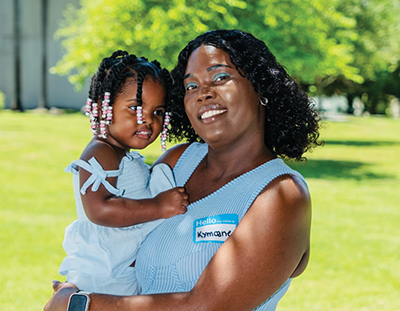October highlights need for early detection among Black women
By Amelia Orjuela Da Silva, Miami Times Staff Writer
Kymoane Jones was just beginning her journey as a new mother when life threw her a curveball. She was enjoying a routine moment, taking a shower, when she felt a lump near her armpit. That seemingly small discovery in October 2023 led to a life-altering diagnosis: stage 3 breast cancer.
“I was shocked,” she said, still grappling with the weight of that moment. “When I heard the words ‘your test results came back, and yes, it’s cancer,’ I was flabbergasted.”
Jones’ experience is a stark reminder of the challenges many Black women face regarding breast cancer. According to the American Cancer Society, Black women face a 40% higher mortality rate from breast cancer compared to their white counterparts. In fact, only 58% of Black women are diagnosed at an early, localized stage, compared to 68% of white women, underscoring the need for increased awareness and early detection.
(African American Breast Cancer Alliance via Facebook)
Dr. Lauren Carcas, an oncologist at Baptist Health Miami Cancer Institutewho specializes in breast cancer, sheds light on these critical statistics.
“Understanding your risk is vital,” she said, noting that family history and hormone exposure significantly affect an individual’s risk profile.
(Amelia Orjuela Da Silva for The Miami Times)
“If women start their period early or go through menopause late, their risk increases,” she explained.
Factors like a woman’s age during her first pregnancy and alcohol consumption also play roles in determining breast cancer risk. Carcos said that despite Black women facing a higher mortality rate, early detection remains key to improving outcomes.
(Courtesy of Florida Breast Cancer Foundation)
“Screening saves lives. The earlier you catch it, the better your chances,” Carcas said.
Regular mammograms are crucial; approximately 78% of Florida women aged 50-74 received mammograms in the past two years, yet many still need to be made aware of the importance of early screenings.
(Amelia Orjuela Da Silva for The Miami Times)
Carcas also acknowledged systemic issues affecting many Black women, including limited access to quality healthcare.
Jones experienced these issues during her treatment; she recalled facing challenges with her insurance.
(Amelia Orjuela Da Silva for The Miami Times)
“To see a specialist, I had to get a referral from my primary care doctor, which was often a struggle. Sometimes, I’d show up for an appointment, and they wouldn’t have sent the referral. It was incredibly frustrating.”
Carcas further discussed how disparities in care contribute to late-stage diagnoses.
(Amelia Orjuela Da Silva for The Miami Times)
“Many Black women present with more aggressive forms of breast cancer at younger ages,” she said. “They need support and access to screenings and treatment.”
